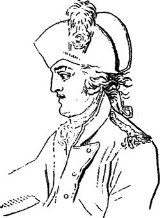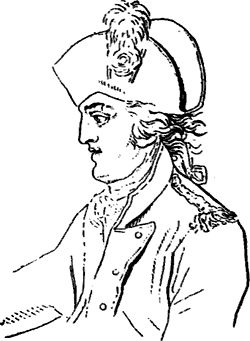
Antoine Joseph Santerre
Encyclopedia

Paris
Paris is the capital and largest city in France, situated on the river Seine, in northern France, at the heart of the Île-de-France region...
– 6 February 1809) was a businessman and general during the French Revolution
French Revolution
The French Revolution , sometimes distinguished as the 'Great French Revolution' , was a period of radical social and political upheaval in France and Europe. The absolute monarchy that had ruled France for centuries collapsed in three years...
.
Early life
The Santerre family moved from St. Michel- en Thierrache to Paris in 1747 where they purchased a brewery known as the Brasserie de la Magdeleine. Antoine Santerre married his third cousin Marie Claire Santerre, daughter of a wealthy bourgeois brewer, Jean François Santerre, from the Cambrai in March of 1748. The couple had six children, Antoine Joseph being the 3rd. The others were Marguerite, born in 1750; Jean Baptiste, born in 1751; Armand Théodore, born in 1753; followed by François and Claire. The future general's father died in 1770, his mother just months later. His elder brother and sister, Marguerite and Jean Baptiste took charge of the household and family business, helping their mother raise the younger children, they never married. Armand Théodore went into the sugar business, and owned a factory in Essonnes, the other members of the family remained in the brewery business. François, known as François Santerre de la Fontinelle, had breweries in Sèvres, Chaville and Paris and Claire, the youngest, married a lawyer.Antoine Joseph was sent to school at the collèges des Grassins, followed by history and physics under M.M. Brisson and the abbot Nollet. His interest in physics led advances in beer production that pushed breweries out of their infancy.
In 1770 Antoine Joseph was emancipated, and 2 years later, with his inheritance he purchased with his brother François Mr. Acloque's brewery at 232 Faubourg St. Antoine for 65,000 French Francs. In that same year he married his childhood sweetheart, the daughter of his neighbour, Monsieur Francois, another wealthy brewer. Antoine Joseph was 20 years old and Marie François was sixteen. Marie died the following year from an infection derived from a fall during her 7th month of pregnancy.
Years later Antoine Joseph married Marie Adèlaïde Deleinte with whom he had three children, Augustin, Alexandre and Theodore.
Military Life
His generosity won great popularity in the Faubourg St. Antoine. When the French RevolutionFrench Revolution
The French Revolution , sometimes distinguished as the 'Great French Revolution' , was a period of radical social and political upheaval in France and Europe. The absolute monarchy that had ruled France for centuries collapsed in three years...
erupted in 1789, he was given command of a battalion of the Parisian National Guard
National Guard (France)
The National Guard was the name given at the time of the French Revolution to the militias formed in each city, in imitation of the National Guard created in Paris. It was a military force separate from the regular army...
and participated in the storming of the Bastille
Storming of the Bastille
The storming of the Bastille occurred in Paris on the morning of 14 July 1789. The medieval fortress and prison in Paris known as the Bastille represented royal authority in the centre of Paris. While the prison only contained seven inmates at the time of its storming, its fall was the flashpoint...
. After the Champ de Mars Massacre
Champ de Mars Massacre
During the French Revolution, on 17 July 1791, the Champ de Mars in Paris was the site of a massacre, the . On that day, the National Constituent Assembly issued a decree that the king, Louis XVI, would remain king under a constitutional monarchy...
on 17 July 1791, a warrant was issued for his arrest and Santerre went into hiding. He emerged again the following year to lead the people of the Faubourg St. Antoine, the eastern units, in the assault on the Tuileries Palace
10th of August (French Revolution)
On 10 August 1792, during the French Revolution, revolutionary Fédéré militias — with the backing of a new municipal government of Paris that came to be known as the "insurrectionary" Paris Commune and ultimately supported by the National Guard — besieged the Tuileries palace. King Louis XVI and...
by the Paris mob, which overwhelmed and massacred the Swiss Guard
Swiss Guard
Swiss Guards or Schweizergarde is the name given to the Swiss soldiers who have served as bodyguards, ceremonial guards, and palace guards at foreign European courts since the late 15th century. They have had a high reputation for discipline, as well as loyalty to their employers...
as the royal family fled through the gardens and took refuge with the Legislative Assembly
Legislative Assembly (France)
During the French Revolution, the Legislative Assembly was the legislature of France from 1 October 1791 to September 1792. It provided the focus of political debate and revolutionary law-making between the periods of the National Constituent Assembly and of the National Convention.The Legislative...
. Louis XVI
Louis XVI of France
Louis XVI was a Bourbon monarch who ruled as King of France and Navarre until 1791, and then as King of the French from 1791 to 1792, before being executed in 1793....
was officially removed as king soon after.
Santerre was appointed by the National Convention
National Convention
During the French Revolution, the National Convention or Convention, in France, comprised the constitutional and legislative assembly which sat from 20 September 1792 to 26 October 1795 . It held executive power in France during the first years of the French First Republic...
to serve as the jailer of the former king. He notified Louis that the motion had passed for his execution, and the next day, at eight o'clock on a 21 January morning, Santerre arrived at the convicted man's room and said, "Monsieur, it's time to go". He escorted Louis XVI through the some eighty-thousand armed men and countless citizens down the streets of Paris to the guillotine
Guillotine
The guillotine is a device used for carrying out :executions by decapitation. It consists of a tall upright frame from which an angled blade is suspended. This blade is raised with a rope and then allowed to drop, severing the head from the body...
. There are differing accounts of his conduct at the execution itself. According to some, he ordered a drum roll half way through the king's speech in order to drown out his voice. Others say that it was actually General J.F. Berruyer – the man in command of the execution – who ordered the drum roll, and that Santerre only relayed the order. Santerre's family maintained, however, that he actually silenced the drums so that Louis could speak to the people.
Santerre was promoted to General of a division of the Parisian National Guard in July of 1793. When the revolts broke out in the Vendée, Santerre took command of a force sent in to put a stop to the rebellions. He was not as successful as a military commander in the field; his first military operation saw the defeat of the Republican forces at Saumur
Saumur
Saumur is a commune in the Maine-et-Loire department in western France.The historic town is located between the Loire and Thouet rivers, and is surrounded by the vineyards of Saumur itself, Chinon, Bourgueil, Coteaux du Layon, etc...
. After the battle, reports circulated that Santerre himself had been killed; the Royalists
Monarchism
Monarchism is the advocacy of the establishment, preservation, or restoration of a monarchy as a form of government in a nation. A monarchist is an individual who supports this form of government out of principle, independent from the person, the Monarch.In this system, the Monarch may be the...
even composed a humorous epitaph about his death. Nor was Santerre popular among the sans-culottes
Sans-culottes
In the French Revolution, the sans-culottes were the radical militants of the lower classes, typically urban laborers. Though ill-clad and ill-equipped, they made up the bulk of the Revolutionary army during the early years of the French Revolutionary Wars...
he commanded. Wounded soldiers returning to Paris reported that he was living in Oriental luxury and complained that their defeat was due either to his treason or his incompetence. Some demanded that he be relieved of his command or even sent to the guillotine. On the other hand, Santerre was not in supreme command, and not considered responsible for the outcome of the war.
In October, Santerre returned to Paris, where his popularity in the Faubourg St. Antoine was undiminished. Nevertheless, his report on this expedition, in which he drew attention to the plight of the Republican army in the Vendée, aroused suspicion. Accused of being a Royalist due to his lack of glory during the battles in the Vendée, he was arrested in April of 1794 and was imprisoned until the fall of Robespierre
Maximilien Robespierre
Maximilien François Marie Isidore de Robespierre is one of the best-known and most influential figures of the French Revolution. He largely dominated the Committee of Public Safety and was instrumental in the period of the Revolution commonly known as the Reign of Terror, which ended with his...
. Upon his release, he resigned his command and attempted to return to business, but his brewery was ruined. He died in poverty in Paris on 6 February 1809.

